A&S Grad Excellence Campaign Awards 19 New Graduate Fellowships
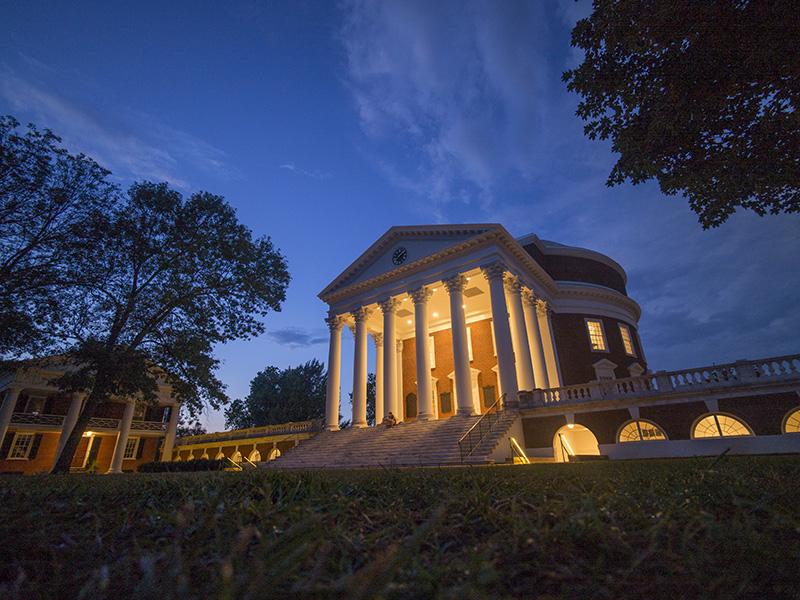
The Graduate School of Arts and Sciences recently announced that it has awarded 19 named fellowships to graduate students to recognize their excellence in graduate research and academic achievements. The fellowships are supported through endowments raised through the Graduate Excellence Campaign, a bold initiative of UVA’s Graduate School of Arts & Sciences and the College Foundation focused on strengthening and expanding graduate education.
The inaugural cohort of 19 graduate fellows represents the best of the school’s graduate research, instructional and academic community. The selected graduate student recipients represent a wide array of research interests across the sciences, arts and humanities, and the social sciences. T. Brent Gunnoe, interim associate dean for graduate education and Commonwealth Professor of Chemistry, said a new cohort of fellows will be selected each year as part of the program’s commitment to elevating graduate education and fostering transformative educational experiences and innovative research, scholarship and teaching.
“Our extraordinarily talented graduate students are a central force in education and research at UVA,” Gunnoe said. “Support from the Graduate Excellence Campaign recognizes and celebrates their efforts as pioneers at the very frontier of discovery, innovation and instruction.”
“Our graduate students bring exceptional talent to the University and enrich our entire academic community,” said Christa Acampora, Buckner W. Clay Professor of Philosophy and dean of Arts & Sciences. “These fellowships, made possible by the incredible generosity of our donors, enable these talented scholars to scout the frontiers of new knowledge, address pressing global challenges, serve as thought-partners to our faculty, mentor undergraduate students, and make a lasting impact in their fields. Their contributions enrich the University and society as a whole.”
Meet a few of this year’s Graduate Fellows.
Emily Gregory, Arani Family Grand Challenge Fellowship
Currently conducting fieldwork in Brazil, Emily Gregory is researching what she calls a “laboratory of democracy.”
A doctoral candidate in the Department of Politics, Gregory studies comparative politics and political methodology. Now in her fourth year, she’s collecting data in Rio De Janeiro where she’s studying lower-income urban communities that are increasingly among the most vulnerable to the consequences of climate change and natural disasters.
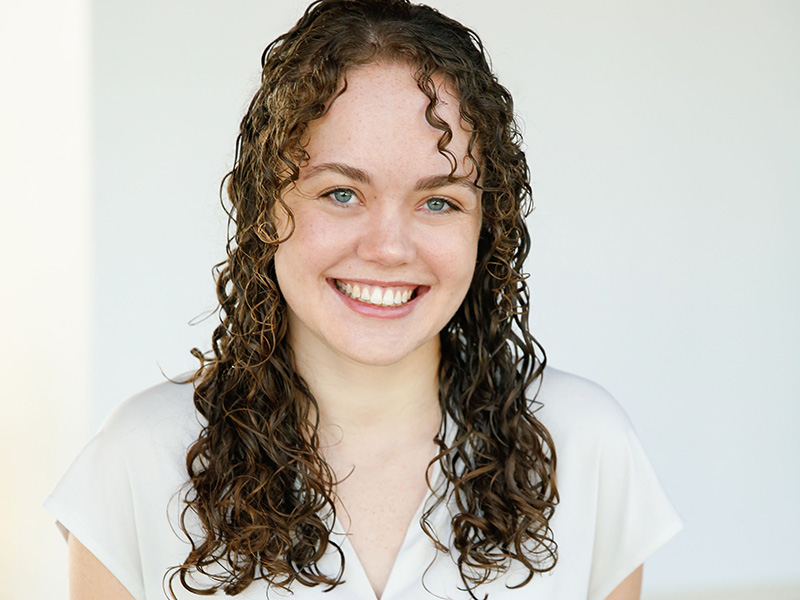
The need to develop economic and infrastructure policies for these communities is becoming increasingly urgent , Gregory said, but they are also becoming home to a variety of innovative political and collective-action solutions that she feels could become a roadmap for the future.
Ultimately, Gregory is interested in a career in higher education, in a position that allows her to blend teaching and research with her work in international development, advancing the scholarship in her field in ways that offer practical solutions to the communities she studies.
According to Gregory, the Arani Family Grand Challenge Fellowship is helping her exceed her expectations of what the pursuit of a graduate degree could be.
“I’ve been blown away by the type of support that I’ve received for my work,” Gregory said. “UVA has been more willing and enthusiastic than I ever imagined a university could be about pushing me to be able to not only do the work that it takes to finish a Ph.D. but to be able to do so at the highest possible level. “This kind of support has been invaluable for helping me complete my work, but it has also given me much higher aspirations for where I can go after UVA and the kind of contribution I can make to my field.”
Abby Lovett, John L. Nau III Endowed Graduate Fellowship in American History
First-year doctoral candidate Abby Lovett is a student of late 19th and early 20th century Southern history; she is specifically interested in race and labor in the South and the changes that were happening in public institutions after the abolition of slavery.
Lovett explained that the impoverished communities in northwest Florida where she’s from led her to ask questions about the historical origins of social inequity and the institutions that created those communities.
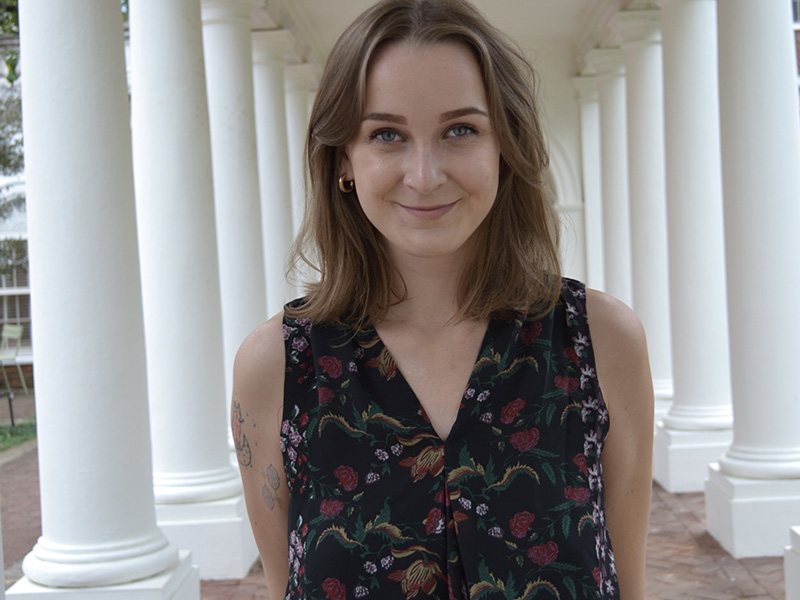
Lovett plans to take a closer look at the Albemarle County poor house, once located on what are now UVA’s North Grounds. Thomas Jefferson’s Statute for Religious Freedom, a law passed in 1786 that established the separation of church and state, transferred the responsibility of caring for the impoverished from the church to the state, and Lovett is interested in the both the immediate and long-term implications of that law.
“In a way, we had a better system of poor relief in the early 19th century,” Lovett said. “I’m interested in understanding how that changed.”
UVA was a top choice for Lovett, who is interested in a career in higher education or public history. The John L. Nau III Endowed Graduate Fellowship in American History, which was offered to her as an applicant, provided her with both the funding and the support she needed to attend. It also served as an acknowledgement of the value of her work, she said.
“The fellowship is giving me the opportunity to pursue something that I believe is meaningful but that also has the capacity to, if not change the world directly, to at least help people understand the world we live in and help them understand why it is the way it is,” Lovett said.
Elizabeth Godschall, Matthew and Sharla Wilson Graduate Fellowship
Now in her fifth year of her doctoral studies in biology, Elizabeth Godschall is focused on the neurobiology of eating. As a neurobiologist, she studies the regions of the brain affected by pharmaceuticals like Ozempic and Mounjaro that are being used to control type-2 diabetes and manage weight loss. Godschall hopes to better understand how these medications, normally considered appetite suppressants, work in the brain with the aim of understanding how they might also be able to play a role in helping those with alcohol and drug addictions.
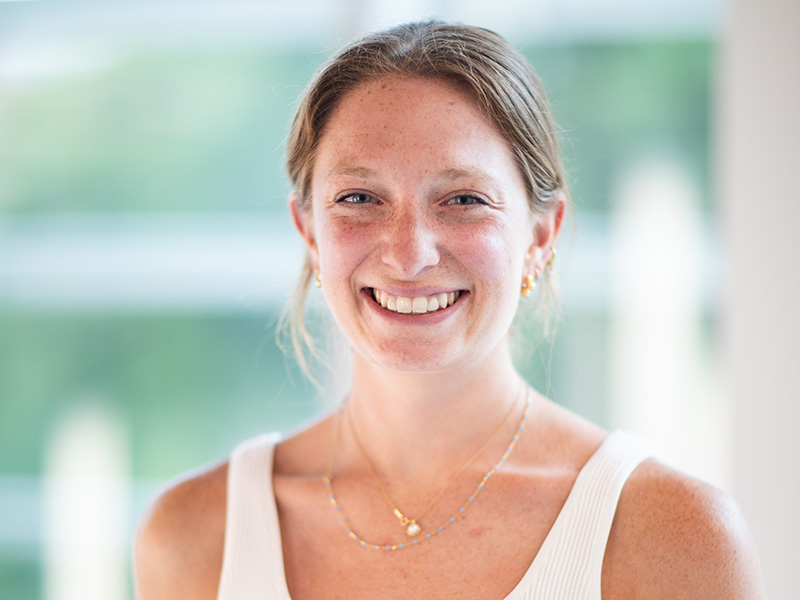
Godschall plans to graduate in the spring of 2025, and the Matthew and Sharla Wilson Graduate Fellowship will provide the opportunity to focus on her research and mentoring in her final semester at UVA.
The trial-and-error process and the hard work of scientific inquiry can leave researchers discouraged about their work and its importance and can leave graduate students feeling like imposters, Godschall said. Receiving the Wilson Fellowship gave her the opportunity to reflect on the broader implications of that work.
“It made me take a step back and remember that what I’m doing is interesting and very worthwhile, important work,” Godschall said.
Jose Ferrer, Jackson Farrell Graduate Fellowship in Economics
Originally from Chile, Ferrer moved to the United States in 2018 with the intention of pursuing an advanced degree leading to a career working with economic policy-making institutions like the Federal Reserve, the International Monetary Fund, the World Bank or even the Central Bank of Chile.
“I knew fairly early that studying economics was what I wanted to do, and this is a culmination of plan that’s been brewing for a long time for me,” said Jose Ferrer, a fourth-year doctoral candidate and UVA’s Jackson Farrell Fellow in Economics.
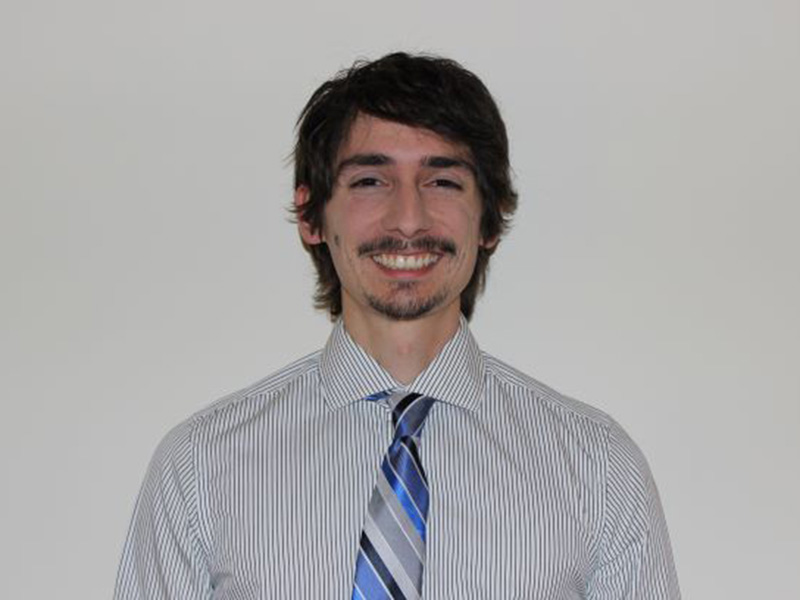
Ferrer’s research is focused on understanding the origins of inflation at a fundamental level and how governmental economic policies impact it.
“There’s a long tradition of thinking about inflation as exclusively a result of what monetary policy or the Federal Reserve Bank is doing. There’s also been a lot of focus on what inflation is in large, more developed economies, but my research is about what economic policy, broadly speaking, can do for inflation in the context of smaller emerging economies like Chile, for example,” Ferrer said.
“The work is very theoretical, but at the end of the day, my work has very concrete implications for real-world economic policy,” Ferrer added.
While the financial support Ferrer receives from the Farrell Fellowship is important, Ferrer said, “The motivation that it gave me, and the opportunity to see that the importance of my work is recognized…that may be more important in the long run.”
The other graduate fellows in this inaugural cohort include the following students:
- Justin Winokur, Department of History, Norman A. Graebner Bicentennial Fellowship
- Olivia Allison, Department of Psychology, Elizabeth and Walker Simmons Bicentennial Fellowship
- Rachita Dash, Department of Chemistry, Littleton Glover Endowed Graduate Fellowship
- Daniel Siela, Department of Chemistry, Carey Mignerey Graduate Fellowship
- Anmol Agarwal, Department of Economics, Rob and Claudia Fauber Graduate Excellence Fellowship
- Louis Bubrig, Department of Biology, Lisa A. Smith Endowed Graduate Fellowship
- Madhumita Chatterjee, Department of History, Bynum Family Graduate Fellowship
- Kyle Peterson, Department of Statistics, Bynum Family Graduate Fellowship
- Taina Quiles-Kwock, Department of Psychology, Stepanian Graduate Fellowship
- Hannah Loeb, Department of English, Stepanian Graduate Fellowship
- Jacob Lollis, Department of Politics, Purtill Graduate Fellowship
- Nazli Azergun, Department of Anthropology, Steven M. and Joyce E. Tadler Graduate Fellowship for Global Development Studies
- Sagar Kasar, Department of Biology, Thompson Dean Family Foundation Graduate Fellowship
- Yiren Ding, Department of Economics, Everette L. Doffermyre, Jr. Graduate Fellowship in Economics and the Law
- Gabe Halford, Department of Chemistry, Donald F. Hunt Graduate Fellowship in Chemistry






